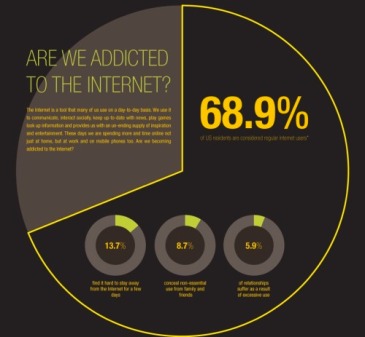
To date, a lot of mental disorders have been found through census and psychiatric hospital statistics. All of them have been published by the American Psychiatric Association in a manual popularly known as the Diagnostic and Statistical Manual of Mental Disorders (DSM). The DSM is written in a common language that is understood by all readers and standard criteria for the classification of all mental disorders are properly described in it. This manual is often used by clinicians, researches, regulation agencies, health insurance companies and several other health related bodies. There is one disorder that has been affecting a lot of people today due to the advancements in technology and the fact that, our society is running on a tech-first basis. Internet addiction which is formally known as Internet Use Disorder (IUD) has entered the DSM last year in their freshly revised DSM-V edition.
What is Internet Addiction Disorder?
In this era, where technology and internet is the solution to pretty much every individual’s problems, it is not rare to find out if a person is suffering from this disorder. Internet addiction is defined as any obsessive behavior in regards to online related mediums, which disrupts the individual’s normal living and has not only affected him/her, but also everyone around him/her such as family, friends, loved ones and colleagues. . This disorder covers a variety of problems such as cybersex addiction (internet pornography), cyber-relationship addiction (social networking), net compulsions (online gaming, gambling), information overload (web surfing) and computer addiction (computer games or programming).
Interesting facts about Internet addiction Disorder
In Asian countries such as China and Korea, people experience higher rates of problematic internet usage than USA, with as much as 30 percent of the population addicted. This is not very surprising as China and Korea rely heavily on technology and these countries introduce new inventions on a regular basis. In regards to gender, men are more likely to suffer from internet addiction than females. That does not mean that females do not get addicted. Females get addicted to sexting, social media and online shopping whereas males get addicted to online gaming, pornography and online gambling.
How do people get addicted to the Internet?
There are often times when people either gets stressed, feel lonely, depressed or anxiety, and in order to escape this reality, they look for something that will make them forget about their sufferings temporarily. Obviously, Internet is the perfect solution for this as you can spend hours on it without even realizing what is going on around you. There are other better alternatives such as exercising and meditating which can help an individual in these situations but the fact that Internet barely requires you to put in any effort proves to be the best escape. In other words, Internet addiction can be easily compared to other addictions like drugs and alcohol because the individual develops a relationship with their ‘chemical’– this relationship takes priority over every other aspect in your life . Drug addicts or alcohol addicts use these chemicals to feel ‘normal’ and in the same way, some people use internet to feel normal. Internet addicts prefer temporary pleasure rather than permanent pleasure (exercising, meditating) and as a result, they struggle to control their behaviors and question their self-esteem. Internet can be a good and bad thing; you will just need to know how to control yourself.
Signs and symptoms of Internet addiction
- A person who is addicted to the internet often shows signs of discomfort, disinterest and irritability when they are away from the internet.
- Person may make excuses by downplaying the amount of time spent on the internet to avoid being classified as a person with the disorder
- Unable to control the amount of time spent on the internet
- The person will lose track of time without even realizing it
- Negative Impact on other aspects of their lives
- Escaping from several confrontation situations.
- Isolation from family and friends
- Sometimes, symptoms could be physical such as Carpal Tunnel Syndrome, dry eyes, back aches and weight gain
Tips for breaking the addiction
- Recognize the problem that you are hiding by using the internet as a means of escape.
- Find new ways to cope with stress
- Build your social network and relationships in real life rather than the internet
- Replace all your internet usage with healthy activities such as yoga or sports.
Conclusion
There are so many ways to deal with Internet addiction. Several countries have opened up rehabilitation facilities (video below) and support networks such as friends and family are key to break any sort of addictions. In a society like this, where technology is taking over the norms through means of social network and convenience, people will need to learn to control them. If not, they will be sucked in very easily as the Internet can easily be considered a drug…which will eventually turn you into an Internet addict.
*****
China was the first country to organize a rehabilitation center for Internet addicts. Take a look at this documentary as it will clearly explain how they go about treating this disorder


